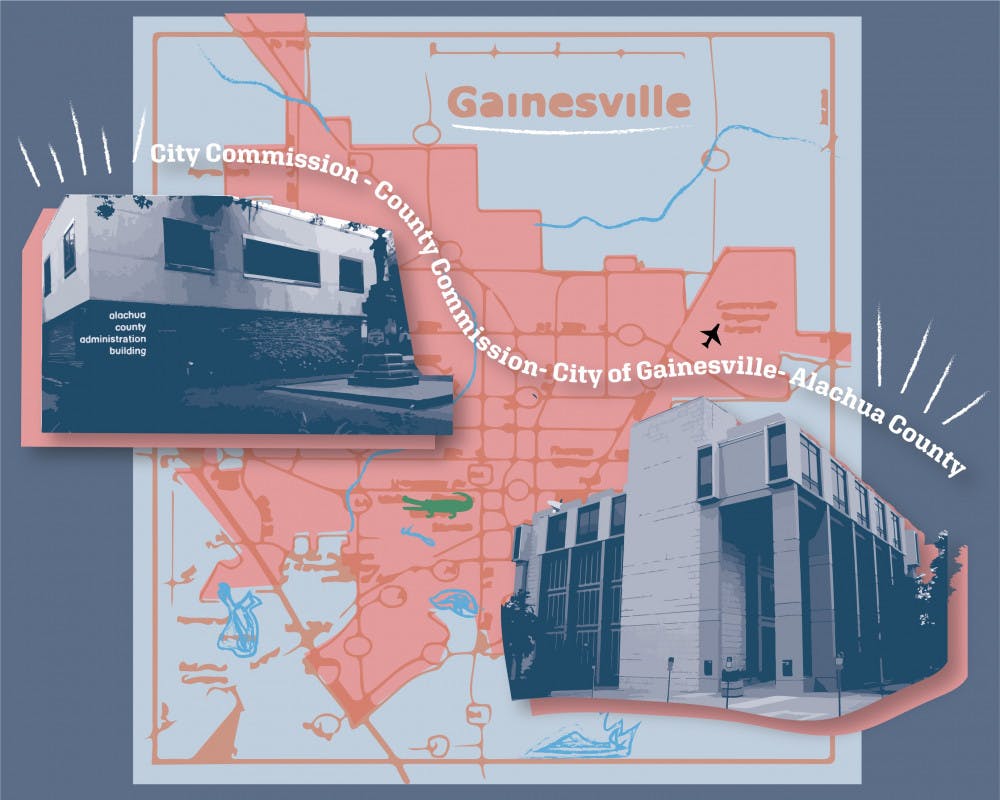As Gainesville nears a special election to replace a city commissioner, candidates and students are working to remedy record turnout lows from the spring.
Voter turnout during city elections is notoriously low, with less than 11% of eligible voters participating in the election where Commissioner Gail Johnson and Commissioner Desmon Duncan-Walker’s earned their seats on the commission. The county decided to combine future city and county elections to increase turnout.
As of Sunday, almost 8,000 ballots have been cast according to the Supervisor of Elections Office — representing about 8.8% of total eligible voters in Gainesville. More than 6,000 of the ballots have been mailed in.
College-aged students have historically had low voter turnout, according to the Campus Vote Project. Although rates have increased for presidential elections, Campus Vote Project reports that college students are less likely to vote because they move frequently and are less likely to be contacted by political campaigns.
Members of the Gainesville and UF community have made it their mission to involve UF students in the city’s upcoming election for Nov. 16. Whoever is elected will replace Johnson and serve until 2024.
Anton Kernohan, a 22-year-old UF political science and sustainability senior, worked as city commission candidate Cynthia Chestnut’s campaign manager when she first launched her campaign in August.
Being a young campaign manager allowed Kernohan to get other UF students involved with political processes and campaigns. He said he encourages UF students to vote because city commissioners can make decisions that impact them.
Students also need to educate themselves on local issues because if all UF students were to vote, they could disproportionately affect the votes of other Gainesville residents, Kernohan said.
“You are going to be residing in this community for the next four years and you should be contributing to it politically if you can,” Kernohan said. “You should be voting in your local elections here.”
Bringing voter registration and digital campaigning to students can help get them involved, Kernohan said. He also said bringing the campaign to campus, such as passing out flyers in Plaza of the Americas, can help meet students in the middle.
“Young people really have an opportunity to change the shape of politics if they’re willing to be informed and willing to be educated about issues and willing to get involved,” he said.
Student organizations are also involved in getting students interested in elections. Brian Marra, a 20-year-old UF history and English junior, is the political director of UF College Democrats. He helped organize a candidate Q&A on campus for students.
UFCD has been working to get students registered to vote and has been advertising the election to help get students informed, he said.
Getting involved in local politics may seem mundane, Marra said, especially for a race happening during a non-election year. But because the politics and decisions are local, they have the greatest impact on the local community.
Gainesville and UF shouldn’t be separate entities, he said. Due to low voter turnout in city elections, students who vote will find that their votes have more power than in larger elections, but students’ votes always matter.
“I just don't think that students should be limited based on whether they're from a place or not,” Marra said. “They should be getting involved in local politics because they're there currently and they should have an opinion and a voice in what goes on in the city that they’re in.”
Gainesville City Commission candidate Matt Howland said it’s integral for UF students to get engaged in local politics.
Local government has the greatest impact on people’s day-to-day lives, Howland said.
UF students can live in Gainesville for years and often settle down in the area. Whether students choose to stay long-term in Gainesville or elsewhere, creating new policies can make Gainesville a role model for other cities they may live in down the line.
“If younger generations want to have a say in the future of this country, then they need to start by getting active right now locally,” Howland said.
To get students involved in his own campaign, Howland said he engaged with student organizations like UFCD to offer $20 per hour jobs on his campaign trail. He has four student volunteers working with his campaign now, and he helps them with their own career goals as well.
“You have to be prepared to invest in that student and make sure they get the experience out of it that they're looking for,” Howland said. “That's the only way that we can continue to grow and build this democratic process.”
Residents are also unengaged in local elections, which is why both local governments and residents need to do their part in education on local issues, Howland said. He said his goal is to knock on 5,000 doors — he’s visited about 4,952 houses — before Election Day to ask citizens about issues important to them.
“I’ve walked over 400 miles since the campaign began, but that’s what it takes to try to get the voters to go to the polls,” Howland said.
Contact Meghan at mmcglone@alligator.org. Follow her on Twitter @meggmcglone.

Meghan McGlone is a UF junior majoring in journalism and English, and this year she’s the City and County Commission reporter. In past years, she’s served as the University Editor, the Student Government reporter, and other positions. Her favorite past time is eating gummy worms and reading a good book.






